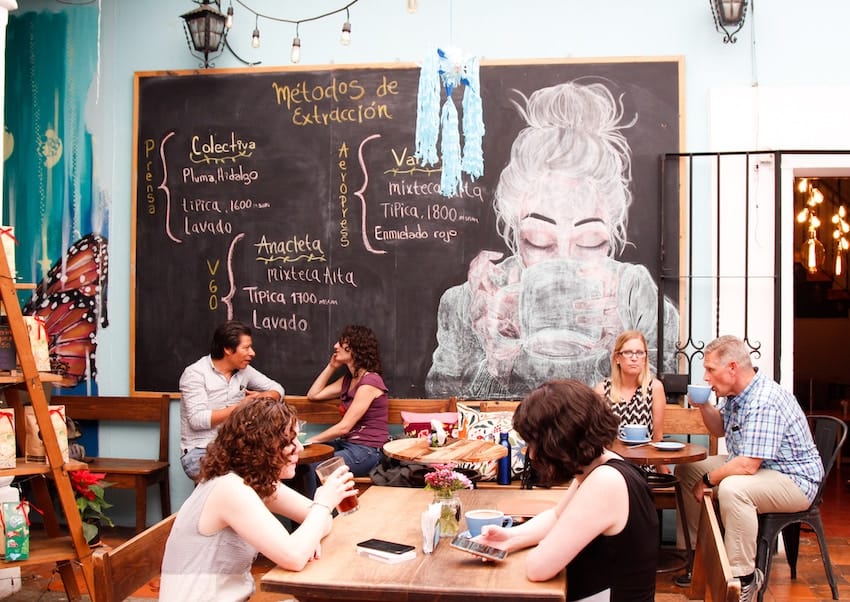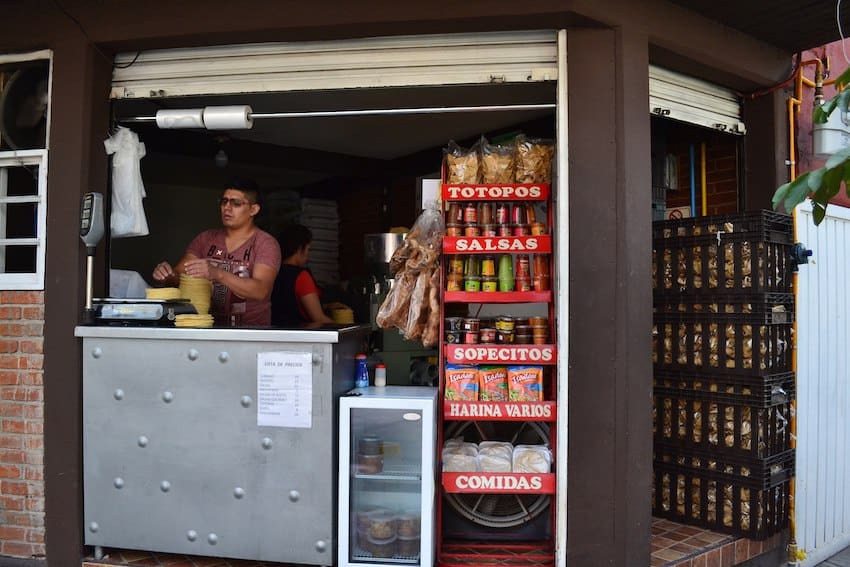Prior to my move to Mexico City, I spent a decade living in Miami, Florida, where it’s often said that 60% of residents speak only Spanish at home.
Growing up in New Jersey, my school began offering Spanish classes when I turned 12, which I immediately signed up for. I continued studying Spanish through college and spent six months living in Barcelona after graduation. I’ve worked in Cuba, Spain and other Latin American countries.
Why am I telling you this?
Because here I am, nine months into my new Mexican life, still speaking mostly English. So much of my day is in English: my writing, my phone conversations with family, my chats with friends — including the ones from Mexico!

A few weeks ago I got fed up. This was not the plan. I want to master this beautiful language once and for all.
And because I haven’t married the Mexican man of my dreams — yet — I decided to start incorporating Spanish into almost everything I do.
In just a few weeks, I’ve noticed a vast improvement. I’ll tell you how I did it.
First things first: you must commit — like you’d commit to anything else: getting healthy, losing weight, improving your relationship, saving a bunch of money so you can finally move to Mexico. It’s crucial, and it’s absolutely doable.
The kicker: all of the following activities must be conducted in Spanish and Spanish only. It doesn’t matter how much you actually understand. What matters is that you hear the pattern, get used to the words and start to get comfortable with the structure.
It might be hard at times, because learning a new language is hard. However, if you plan to spend a sizable amount of time in Mexico (and who wouldn’t?) it’s your duty to have a good grasp of the native tongue.
The fun part: I’ve compiled a list of 20 ways to enhance your Spanish speaking and comprehension, none of which involve a classroom; okay, two involve classrooms, just not in the traditional sense.

1. The first language you hear and speak in the morning should be Spanish. Even if you’re talking to your cat. Or listening to Pedro Infante. Or counting while doing your morning stretches. Which brings me to number two.
2. Take fitness classes. Review body parts, command verbs and other class-related vocabulary before you go. I notice that taking classes first thing in the morning sets my brain to Spanish mode.
3. Meditate. Use an app and choose only those guided in Spanish. You’re an afternoon meditator, you say? Then…
4. Spend 10 to 30 minutes (or more!) listening to a podcast or audiobook. I like to slow mine down to a speed of .08 to give my mind a chance to grasp the words. The key here is to choose a topic that you find interesting! If you don’t care about AMLO in English, you’re not going to care about him in Spanish either. If you prefer visual entertainment…
5. Go to a Spanish-language movie. Or go to a foreign-language movie with Spanish subtitles. In the theater. With popcorn. Make it memorable.

6. Watch Spanish language series with Spanish subtitles on your preferred streaming service. You’ll get used to the melody and probably gain some very valuable insight into the culture.
7. Sign up for local tours of your city or the surrounding towns. Excellent for reinforcing past tense and getting attuned to the fascinating history of this incredible country.
8. Take a cooking class. Find out what the menu will be, and study the names of ingredients, utensils and actions you might encounter, like stir, shake, chop, mince, etc. The culinary benefits are obvious, and deciphering Mexican menus will suddenly be that much easier.
9. Attend an author talk. If you can’t read the book first, read a summary so you have an idea of the subject matter. If you’re really ready to put yourself in the hot seat, prepare a question or two. The audience always gets the chance to pick the author’s brain.
10. Visit a museum. Get the audio set in Spanish or read only the Spanish side of the labels.

11. Read Mexican newspapers. You can buy one for just a few pesos or find free editions on the street. Commiting to a few articles a day is hugely helpful for vocabulary, sentence structure and conversation material for your next dinner party.
12. Choose to live in a neighborhood that isn’t full of expats. Now this is certainly easier said than done. Not everyone has the ability to up and move. If you’re stuck for the foreseeable future with English-speaking neighbors…
13. Choose to spend your time working, shopping or sipping coffee in a neighborhood that isn’t full of expats. So if you’re living in Mexico City like me, I do not want to catch you at a cafe in Condesa. And you won’t because I refuse to go.
14. Listen to music in Spanish. Read the lyrics while you listen. It’s a great way to understand verb tenses and colloquial vocabulary. If you listen to Luis Miguel or José José or Alejandro Fernández, you’ll also be gaining valuable skills in romance.
15. Change the language on your phone to Spanish. This is how I learned how to say “copy/paste” — invaluable information.

16. Sign up for a language exchange. Someone out there wants to improve their English and is willing to barter and improve your Spanish. You might even make a new friend (if you want one). If you don’t want to be around people in real life…
17. Sign up for the iTalki app (or something similar). It showcases thousands of online tutors offering economical one-on-one lessons, small group classes and free conversation practice. All accessible from your phone.
18. Read children’s books. This is a surprisingly wonderful way to expand your basic vocabulary, epecially useful if you’re beginner to intermediate. Advanced speakers might find this useful as a refresher for those words we know we know but we don’t use enough to remember.
19. Go on dates. If you’re single and you’re cool with apps, choose dates who are willing to speak Spanish with you. That way, even if you don’t want to see them again, you’ll have learned something useful, like how to say “I don’t want to see you again.”
20. Keep practicing. This is the bottom line. No amount of worksheets, group classes, or one-hour-a-week private tutoring sessions are going to make you conversational if you aren’t forcing yourself to be around it as much as possible. And you’re in Mexico, so it isn’t that hard. Make a commitment to yourself and follow through, and you’ll reap the rewards.
